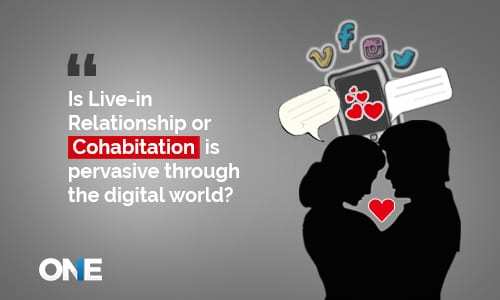Жизнь в отношениях или сожительстве не является новой нормой в наши дни. Но за годы, прошедшие с тех пор, как технологии вышли на новый уровень в плане сотовых телефонов и интернета, сожительство широко распространено, особенно среди людей в возрасте от 20 до 20 лет. Норма обращения к кому-то, чтобы жить - в отношениях стала в сто раз легче, чем когда-либо прежде.
Приложения для обмена сообщениями в социальных сетях, приложения для знакомств, сотовые сети смартфонов и другие цифровые устройства, подключенные к Интернету, в наши дни готовят даже подростков, чтобы иметь кого-то в отношениях в цифровом мире.
Таким образом, в современном обществе растет сожительство или отношения «живи в жизни», молодежь находится на вершине выбора таких отношений с использование цифрового мира, Следовательно, смена гендерных ролей и высокие ожидания откладывают пожениться культура ведущие люди иметь твердое убеждение двигаться вместе, прежде чем связать себя узами брака.
Большинство американских взрослых думают, что жить - это хорошая идея, прежде чем связывать себя узами брака. Почти две трети взрослых (65%) решительно поддерживают сожительство перед вступлением в брак, по сравнению с 35%, которые выступают против этой школы мысли
По данным Мичиганских Новостей
В новостях из «Мичиганских новостей» говорится, что существует три основные причины, по которым необходимо жить или жить вместе: хотеть проводить больше времени с партнером, делиться финансовым бременем и знать о реальная совместимость перед женитьбой, Тем не менее, в наши дни молодые подростки используют виртуальный мир, чтобы найти кого-то в сети, а затем познакомить с ним в реальной жизни, чтобы сожительствовать или вступать в живые отношения в поисках сексуальных потребностей.
Почему женщина хочет жить в отношениях
Сегодня женщины среди молодых подростков говорят «Любовь» как подлинная причина жить вместе в три раза чаще, чем мужчины.
Почему Мале хочет сожительствовать?
Они назвали «секс» главной причиной, чтобы жить вместе в четыре раза чаще, чем женщины.
И мужчина, и женщина думают, что отношения между жизнью и жизнью представляют собой временные отношения, чтобы узнать о совместимости, но настоящая разница возникает, когда основные цели жизни собираются. Более того, поскольку технология выходит на передний план с точки зрения приложений для обмена мгновенными сообщениями и приложения для знакомств, такие как Tinder и мужчина, и женщина хотят иметь свидания вслепую, чтобы выполнять сексуальные мотивы, а не проверять совместимость. Это означает, что преследование среди подростков и молодых людей находится на подъеме, независимо от того, считают ли они просто сожительство или живые отношения.
По данным исследовательского центра PEW
- Число взрослых американцев, проживающих вместе с партнером, растет, и 7% взрослых американцев проживают вместе с партнером в 2016 году.
- Американские взрослые, живущие с незамужним партнером, достигли примерно миллиона юаней
- Молодежь, живущая в отношениях, 29% в 2007
- Половина взрослых, живущих в отношениях, не старше 35
- Сожительство растет с явным темпом среди 50 и старше
- Generation Zers, Millennial, Generation Xers и Baby Boomers верят в живые отношения
- 41% выступают против живого общения
- Приложения для социальных сетей и интернет - главная причина слепых знакомств и живых отношений
70% взрослых, состоящих в живых отношениях, используют Интернет в США и используют социальные сети, включая Facebook. 75% из них утверждают, что регулярно заходят в систему несколько раз. Некоторые говорят, что с помощью Facebook они встретились со своим партнером
Опасно ли жить в отношениях или сожительствовать в течение часа семейных жизней?
Согласно отчету, опубликованному Национальным проектом брака, живущие в браке отношения представляют собой главную угрозу для американских детей и подростков, поскольку затмевают развод и затмевают одинокое материнство. По словам авторов исследования, возглавляемого Брэдом Уилкоксом из Университета Вирджинии, это больше, чем просто проблема для семей с низким доходом, у которых больше шансов иметь незамужних родителей. автор далее заявил что дети подвергаются сожительству, например, подросткам и подросткам, имеющим доступ к социальным сетям.

Таким образом, в конечном итоге, когда у них есть пример своих сожителей, они с большей вероятностью усыновят отношения с использованием приложений для знакомств, социальные сети и интернет с помощью мобильных телефонов, подключенных к Интернету.
Кроме того, молодые подростки и подростки начинают иметь кого-то, чтобы быть в живых - в отношениях, которые могут быть Сталкер или сексуальный хищник, Дети, рожденные от не состоящих в браке родителей, обычно безопаснее с эмоциональными проблемами, менее вовлеченными и менее любящими отцами, риском школьной неудачи, высоким риском младенческой смертности и меньшим физическим здоровьем по сравнению с женатыми родителями.
Более того, соотношение одиноких мам, которым нужно работать на хлеб с маслом, не сможет эффективно воспитывать детей. Тем не менее, в наши дни цифровое воспитание детей стало нормой защитить детей от всевозможных опасностей.
Сожительство или живые отношения не могут быть альтернативой браку », - говорится в исследовании. Уилкокс сказал на мероприятии в Институте американских ценностей, где он обсуждал исследование «сожительство и дети не смешиваются
Риски, связанные с сожительством или живыми отношениями
74% Сожители сравнивают с 56%, которые состоят в браке с большей вероятностью вступать в половую связь до достижения возраста 18. Это означает, что подростки, чьи родители жили в отношения могут питать сексуальные фантазии и может также участвовать в незафиксированных сексуальных действиях прежде, чем стать взрослым.
Кроме того, сожители могут привести к нежелательной беременности и это 43.3 по сравнению с замужними женщинами, которые 23.9%, Эти типы факторов риска уже преобладают в обществе.
С другой стороны, с таким огромным влиянием сотрудничества
приучая к молодым людям может привести их к секстингуизнасилование, издевательства в Интернете, преследование с ростом и ростом технологий сотовых телефонов и Интернета.
Те, кто верит в отношения «живи в браке» или «Сожительствуй», а затем решают пожениться, говорят о низком среднем качестве брака и больше склонны заканчивать разводом. Кроме того, молодые поколения, воспитываемые не состоящими в браке родителями, с большей вероятностью становятся ближе к киберугрозам, чем когда-либо прежде, и цифровое воспитание оставило единственное решение.






